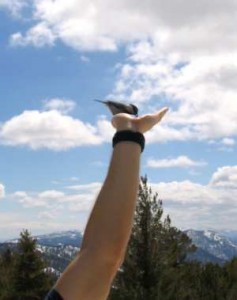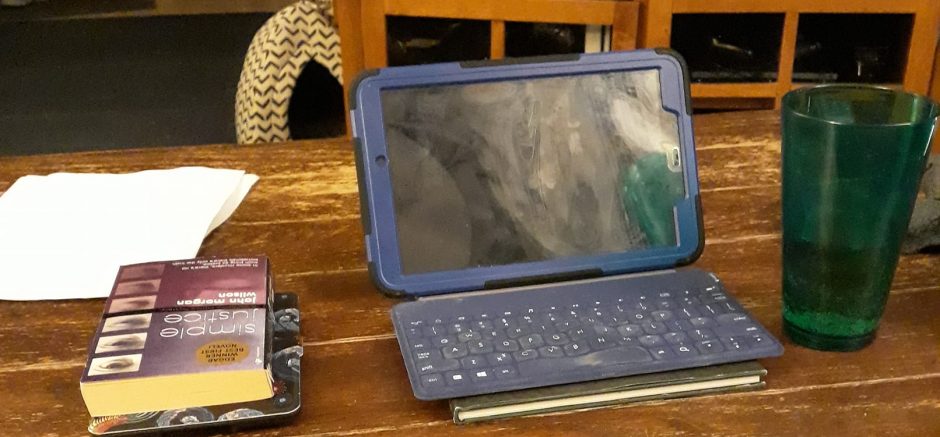Slick with sweat, Sweets stops at the cargo train tracks to catch his breath and fan himself with the Mobile Press Register. He shuffles under the welded arch of the main entrance to the Alabama Dry Docks and a uniformed guard directs him to the employment office. Sweets already knows the way. He carefully chooses a path through piles of rusting scrap and crosses long, dark shadows cast by cranes. Sweets repeats his qualifications aloud over swollen lips. Near the dock, he stops in front of the tug boat, Little Ben, and catches his breath. The tug glistens with fresh paint and hand-rubbed teak. The owner of the shipyard, Benjamin Kale, tags his dead son’s name to everything he builds. Sweets removes his hat and grips it to his chest.
“Hey now, look at olé Sweets,” Wishbone shouts. “Goin’ again!”
Wishbone is lean and tall with hair cropped close. He holds up his welding mask with one hand. His black torso swells with muscle.
The other men look up. They clap and whistle at Sweets from a cracked oil tanker prop. Wishbone drops his mask and relights the acetylene. A cloud of sparks, soot, and steam rises from his torch, then vanishes into white hot sky.
Sweets resumes walking, eyes focused forward. At the backdoor of the office, he tucks in his faded blue work shirt and mops his face with a rag. Inside, unemployed men work the maze, trying their luck at each glass window. Sweets rubs the foot of a rooster between finger and thumb in his pocket. He slows his breathing to even, controlled breaths, then opens the door.
Hours later, Sweets emerges from the building. He sits on the first step. His hips and knees burn. He struggles to breath. Sweets enters and exits by the back door every Monday. The other applicants sit out front. Among them, a young man with smooth almond skin slaps his thigh. He says: No parades, no bond rallies, no jobs. Can’t even shuck oysters. The others nod. Some say amen.
At the back door, Sweets looks up to Wishbone, blackened with soot. He sits down beside him. Both men drip with sweat.
“I’ll get over to Dauphin Street,” Sweets says.
“Kazoola’s might need you.”
“Sho might.”
“Ain’t no way to tell,” Wishbone says.
“Got damn,” Sweets says. “Maybe they’ll be havin another war.”
Benjamin Kale sits behind an ornate mahogany desk in suit and tie. He swivels in his chair and watches Sweets and Wishbone through the third story window. He watches Wishbone move, shirtless, and presses his palm against the glass. Wishbone says something, gesturing with his hands, and Sweets nods. Cold air blows through newly installed air vents. From this distance, Wishbone could be any man. He could be white. He is young and strong and virile. He might be a navy boy, home on leave. Sweets might be his father.
Suddenly, the air feels over cold and Benjamin closes the vent. He opens the window and leans out as far as he can. He closes his eyes. On the desk, a black and white photograph of his son lies face down against the wood. In the picture, Ben Jr. sleeps on a riverboat bunk, his arms crossed behind his head. In another picture, still upright, twin baby boys peek out from under blankets in a bassinet. Ben Jr.’s wife will take them away. She will take them to her family in New England. They will be raised without a southern accent. They will not know that Benjamin hired Sweets to drive his polished black car, despite the slide in revenue. They will not know that Wishbone will use Sweets to break into the Kale family home.
What they will know is this: A man known as Wishbone split Benjamin Kale’s skull with a fire iron and only got away with his gold watch on a chain. He was never found. My father will discover the watch in a pawn shop thirty years later. In thirty more years, he will die, and I will find it in his desk. I’ve got it in my right hand, right now. My name is Ben. The watch does not keep time.
 Murray Dunlap’s fiction has appeared in the Virginia Quarterly Review, Post Road, Night Train, New Delta Review, Red Mountain Review, Silent Voices and Smokelong Quarterly and others. His stories have been twice nominated to the Pushcart Prize and to Best New American Voices, and his first book, "Alabama", was a finalist for the Maurice Prize in Fiction. After very nearly being killed in a terrible car wreck, the writer uses this site to vent: http://www.murraydunlap.com/.
Murray Dunlap’s fiction has appeared in the Virginia Quarterly Review, Post Road, Night Train, New Delta Review, Red Mountain Review, Silent Voices and Smokelong Quarterly and others. His stories have been twice nominated to the Pushcart Prize and to Best New American Voices, and his first book, "Alabama", was a finalist for the Maurice Prize in Fiction. After very nearly being killed in a terrible car wreck, the writer uses this site to vent: http://www.murraydunlap.com/.






I guess Smokelong deleted their comment…
Smokelong… What on earth does that mean?
Pingback: smokelong quarterly